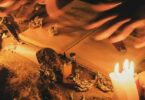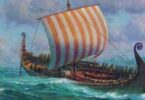MCQ on Vedic Civilisation:
Ques. Division of the Vedic society into four classes is clearly mentioned in the
(a) Yajurveda
(b) Purusa-sukta of Rigveda
(c) Upanishads
(d) Shatapatha Brahmana
Ques. A ‘Sabha’ in the Vedic period was a/an
(a) Institution of professional men in villages
(b) Royal Court
(c) Mantri Parishad
(d) National Assembly of all Citizens of the State
Ques. In the Rigvedic period, after the king the next most Important functionary of the State was the
(a) Senani
(b) Revenue collector
(c) Magician-doctor
(d) Purohita
Ques. The religion of early Vedic Aryans was primarily of
(a) Bhakti
(b) image worship and Yajnas
(c) worship of nature and Yajnas
(d) worship of nature and Bhakti
Ques. Which sage or scholar had recast the original single Veda into four distinct Vedas?
(a) Patanjali
(b) Kapila
(c) Vyasa
(d) Shankaracharya
Related: World War 1 test questions and answers
Ques. The Rig Veda consists of
(a) 1000 hymns
(b) 1028 hymns
(c) 500 hymns
(d) 2000 hymns
Ques. Which of the following Vedas is rendered musically?
(a) Rig Veda
(b) Yajur Veda
(c) Sama Veda
(d) Atharva Veda
Ques. The Vedic Aryans first settled in the region of
(a) Central India
(b) Gangetic Doab
(c) Saptasindhu
(d) Kashmir and Punjab
Ques. ‘Ayurveda’ has its origin in
(a) Rig Veda
(b) Sama Veda
(c) Yajur Veda
(d) Atharva Veda
Related: world history gk quiz
Ques. That the Rig Vedic Aryana were a pastoral people is borne out by the fact that
(a) there are many references to the cow in the Rig Veda
(b) Most of the wars were fought for the sake of cows
(c) Gifts made to priests were usually cows and not land
(d) All of the above
Ques. Which of the following Vedas was compiled first?
(a) Rigveda
(b) Samaveda
(c) Yajurveda
(d) Atharvaveda
Ques. Two highest gods in the Vedic religion were
(a) Agni and Savitri
(b) Vishnu and Mitra
(c) Indra and Varuna
(d) Surya and Pushan
Ques. The famous vedic saying “war begins in the minds of men” is contained in the
(a) Mundakopanishad
(b) Mahabharata
(c) Rig Veda
(d) Atharva Veda
Related: world leaders trivia quiz
Ques. This Vedic God was ‘a breaker of the forts’ and also a ‘war god’
(a) Indra
(b) Yama
(c) Marut
(d) Varuna
Ques. The family of the Rig Vedic Aryans was
(a) Patrilineal
(b) Patriarchal
(c) Matriarchal
(d) Matrilineal
Ques. The word ‘Veda’ has been derived from the root word ‘Vid’ which means
(a) Divinity
(b) Sacredness
(c) Doctrine
(d) Knowledge
Ques. The most important craftsman in the Vedic period was the
(a) blacksmith
(b) goldsmith
(c) carpenter
(d) barber
Related: top 10 biggest Religions
Ques. The description of caste system is found in
(a) Rig Veda
(b) Sam Veda
(c) Yajurva Veda
(d) Atharva Veda
Ques. Which Veda deals with medicine?
(a) Rig Veda
(b) Atharva Veda
(c) Yajur Veda
(d) Sama Veda
Ques. Which of these crops was not known by the people of the Vedic period?
(a) Barley
(b) Wheat
(c) Rice
(d) Tobacco
Ques. The epitome of Indian music is called
(a) Rig Veda
(b) Upanishad
(c) Yajurveda
(d) amaveda
Ques. The meaning of the word ‘Brihi’; is used in Vedic literature is
(a) Barley
(b) Til
(c) Wheat
(d) Rice
Ques. Which of the following Vedas deals with magic spells and witchcraft?
(a) Rigveda
(b) Samaveda
(c) Yajurveda
(d) Atharvaveda
Ques. The Vedic religion along with its Later (Vedic) developments is actually known as
(a) Hinduism
(b) Brahmanism
(c) Bhagavatism
(d) Vedic Dharma
Ques. Which of the following contains the famous Gayatrimantra?
(a) Rigveda
(b) Samaveda
(c) Kathopanishad
(d) Aitareya Brahmana
Ques. The famous Gayatrimantra is addressed to
(a) Indra
(b) Varuna
(c) Pashupati
(d) Savita
Related: India King quiz questions
Ques. The Vedic deity Indra was the god of
(a) Fire
(b) Rain and Thunder
(c) Eternity
(d) Wind
Ques. The Vedic economy was based on
(a) trade and commerce
(b) crafts and industries
(c) agriculture and cattle rearing
(d) all the above
Ques. The Atharva Veda does not discuss the ideal of
(a) Karma
(b) Jnana
(c) Upasana
(d) Moksha
Ques. The ritualistic precepts pertaining to the hymns of the Vedas are known as the
(a) Samhitas
(b) Aranyakas
(c) Brahmanas
(d) Upanishads
Ques. The normal form of government during the Vedic period was
(a) democracy
(b) republics
(c) oligarchy
(d) monarchy
Ques. Which of the following is the oldest of the Vedas?
(a) Sama Veda
(b) Atharva Veda
(c) Yajur Veda
(d) Rig Veda
What are the vedas?
The Vedas are texts of Hinduism that have contributed greatly to world civilization. Derived from the root vid, the word vedas has five different meanings. It can refer to any subject or science, including the creation of the universe. Devotees of Bhagavata call it the fifth Veda. There are many other stories about the Vedas that have been interpreted into stories and songs.
The Vedas have four main compositions: Samhitas, Brahmanas, and Aranyakas. The Samhitas contain hymns and mantras; Brahmanas are prose manuals for Hindu prayer and ritual.
The Vedas are divided into two main parts: Upanishads and Aranyakas. The Aranyakas contain rituals performed in forests and remote places and injunctions for forest dwellers. The Upanishads are one of the most popular sections of the Vedas. Its philosophy reflects the philosophies of human and world life. These books can provide insight into many aspects of Hinduism.
The Vedas were originally in oral form and passed down from teacher to student. They were finally committed to writing between 1500 and 500 BCE. However, the Vedas were carefully preserved orally and they had to be re-transcribed in order to be preserved. In the ancient world, the Vedas were primarily recited orally and memorized by masters. The pronunciation of the verses was highly important.







Rigveda mentions of many things related to ayurveda however ayurveda is upveda of atharaveda. In simple words you can say that there is some mention of ayurveda in rigvega but ayurveda is proper part of atharaveda.
Upveda of the rig veda is ayurveda and the theme is medicinal treatment. But answer of the question related to this is given as atharva veda. Confused.
It was great experience
Ouestion is outstanding
w
Jai shree ram